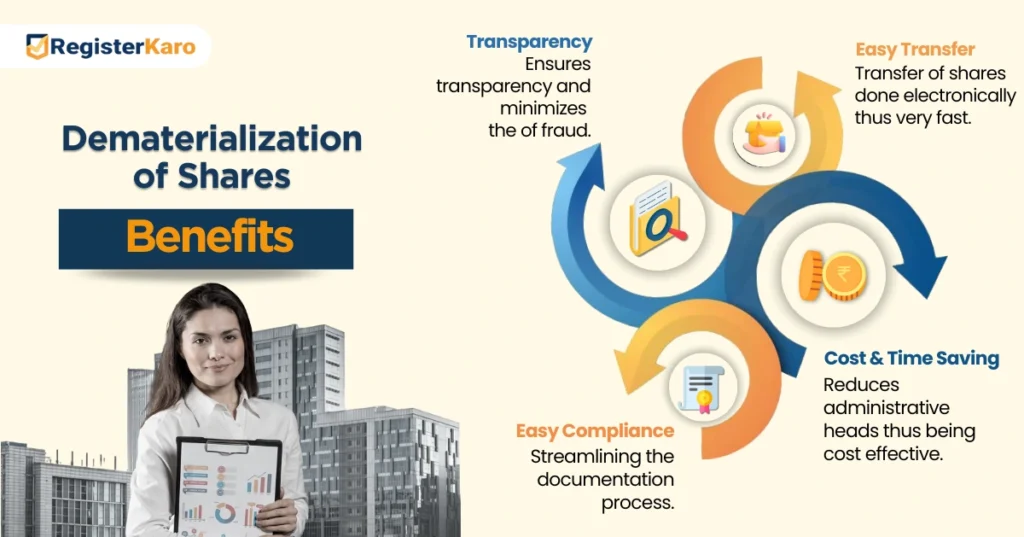
Dematerialization of Shares by Private Limited Companies: A Comprehensive Guide
What is the Dematerialization of Shares?
The process of dematerialization of shares has become increasingly important for private limited companies. With a move towards digitization and paperless transactions, the dematerialization of shares—which refers to the process of converting physical share certificates into electronic form that can be held, transferred, or traded electronically in a demat account—offers numerous benefits while eliminating the need for physical certificates.
If you’re looking to understand the step-by-step process of dematerializing shares or need assistance in ensuring compliance, RegisterKaro can help. Let’s begin with the basics..
Importance of Dematerialization of Shares
Dematerialization of shares represents a fundamental shift in how securities are held and managed, offering significant advantages for private limited companies, shareholders, and the financial market as a whole. The dematerialization of shares of private companies has become increasingly relevant as regulatory frameworks evolve. Here’s why it’s become increasingly important:
Enhanced Security
For private companies, dematerialization of shares eliminates risks associated with physical certificates such as theft, forgery, damage, or loss. Electronic holdings provide a secure environment with multiple authentication layers, dramatically reducing fraud and administrative complications from replacing lost certificates.
Operational Efficiency
The electronic format streamlines share transfers, eliminating the need for physical paperwork, stamp duty on transfer documents, and courier services. The dematerialization of shares of private companies reduces transaction processing time from weeks to mere days or even hours, while also lowering administrative costs and paperwork for all parties involved.
Improved Liquidity and Transferability
Electronic shares enable faster, more efficient transfers even for private companies. The dematerialization of shares of private companies facilitates smoother ownership transitions during funding rounds, acquisitions, or employee stock option exercises. This accessibility encourages investment as administrative barriers are lowered.
Corporate Action Processing
Private companies benefit from more efficient dividend distributions, rights issues, and bonus share allocations through dematerialization of shares. Electronic records ensure accurate, timely delivery of corporate benefits to legitimate shareholders, reducing disputes and administrative burdens.
Transparency and Governance
Dematerialization of shares of private companies creates clearer ownership records with real-time visibility of shareholding patterns. This transparency aids in regulatory compliance, prevents unauthorized transfers, and supports better corporate governance through accurate shareholder identification.
Regulatory Compliance
Many jurisdictions now encourage or mandate dematerialization of shares of private companies. Regulatory bodies are progressively extending dematerialization requirements to private limited companies to improve transparency, reduce fraud, and standardize securities management practices.
Cost Savings
While there are initial setup costs, dematerialization of shares offers private companies long-term savings by eliminating expenses related to printing, storing, and handling physical certificates, as well as reducing the administrative staff needed for manual processes.
How to Convert Physical Shares into Demat
Converting physical share certificates into dematerialized form involves a structured process. Here’s a step-by-step guide:
1. Open a Demat Account
First, the shareholder needs to open a demat account with a Depository Participant (DP) registered with depositories like NSDL or CDSL. This requires completing KYC procedures and submitting identification documents.
2. Complete Dematerialization Request Form (DRF)
Obtain a Dematerialization Request Form (DRF) from your DP. Fill it out with details of the shares to be dematerialized, including company name, certificate numbers, distinctive numbers, and quantity.
3. Submit Documents to the DP
Submit the completed DRF along with the original share certificates to your DP. The DP will verify the documents and provide an acknowledgment receipt with a unique DRF number for tracking.
4. Defacing of Physical Certificates
The DP will deface the physical share certificates by marking them as “Surrendered for Dematerialization” to prevent their misuse while the conversion process is underway.
5. DP Forwards Request to Depository
Your DP will electronically forward the dematerialization request to the depository, which then communicates with the company’s Registrar and Transfer Agent (RTA).
6. Verification by the RTA
The RTA verifies the authenticity of the certificates and checks for any encumbrances or disputes. If all is in order, they approve the dematerialization request.
7. Confirmation and Credit to Demat Account
Once approved, the company’s RTA confirms the dematerialization to the depository. The depository then instructs your DP to credit the equivalent number of electronic shares to your demat account.
8. Electronic Shares Available in Account
The dematerialized shares typically appear in your demat account within 15-30 days from submission, depending on verification processes and any potential discrepancies that need resolution.
9. Intimation and Statement
Your DP will send you a transaction statement confirming the shares have been credited to your account. Most DPs also provide electronic notifications or SMS alerts for such transactions.
For private companies considering the dematerialization of their securities, consulting with a professional service provider experienced in corporate compliance can significantly streamline this technical process while ensuring all regulatory requirements are met.
Understanding the Concept of Dematerialization
Dematerialization involves the replacement of physical share certificates with an electronic format held in a dematerialized account (demat account). This digital shift ensures more security, faster transactions, and ease of management for both the company and its shareholders.
Difference between Physical and Dematerialized Shares
Physical Shares:
- The physical form of shares, i.e., paper certificates.
- Prone to loss, theft, and damage.
- Involves time-consuming paperwork for transfer and other processes.
- Needs physical storage and management.
Dematerialized Shares:
- The electronic form of shares is managed via a demat account.
- Safe and secure, with reduced chances of theft or loss.
- Enables faster, paperless transfers of ownership.
- Requires less administrative effort and cost.
Benefits of Dematerializing Shares for Private Limited Companies
The dematerialization of shares offers private limited companies a strategic pathway to modernize their operations while improving security and efficiency. By converting physical certificates to electronic format, businesses can unlock numerous benefits while ensuring compliance with evolving regulatory standards.
- Improved Transparency and Security
The digital nature of dematerialized shares ensures transparency in the transactions and minimizes the risk of fraud or mishandling. The data is securely stored, making it less prone to errors or tampering.
- Easy Transfer of Shares
The transfer of shares is much faster and easier in electronic form. Instead of physical paperwork, share transfer requests are processed electronically, reducing the time it takes to complete the transaction.
- Compliance with Regulatory Requirements
Private limited companies are required to comply with certain regulatory frameworks. Dematerialization helps them meet these requirements by streamlining the documentation process and aligning with guidelines set by regulatory bodies like SEBI (Securities and Exchange Board of India).
- Cost-Effective and Time-Saving
Dematerialization reduces administrative overheads by eliminating the need for physical certificates, printing, and manual handling of share transfers. It is a time-saving and cost-efficient solution for managing shareholder records.

The Process of Dematerializing Shares
The dematerialization of shares involves a series of steps. Let’s go through them in detail:
Step 1: Choose a Depository Participant (DP)
The first step in the process of dematerialization is to select a Depository Participant (DP). A DP is an intermediary between the shareholder and the depository (such as NSDL or CDSL), and they are responsible for managing demat accounts.
Important: You need to ensure that the chosen DP is authorized by the respective depository.
Step 2: Submit Share Certificates for Dematerialization
Once a DP is selected, you’ll need to submit the physical share certificates to the DP. Along with the certificates, you’ll need to complete a dematerialization request form, which provides the details of your shares.
Step 3: Receive Electronic Share Certificates (Demat)
Upon receiving the physical share certificates, the DP will verify the details and convert the certificates into electronic form. You will then receive your share certificates in the form of a demat account.
Step 4: Confirmation and Updates in the Register of Members
Once the dematerialization process is completed, the private limited company will update its Register of Members to reflect the new electronic records. This process is essential for maintaining accurate records.
Requirements for Dematerializing Shares
To begin the process of dematerializing shares, several important requirements and conditions must be met.
Eligible Shareholders
Typically, only shareholders who hold physical shares are eligible to dematerialize their holdings. Additionally, the shares should not have any encumbrances (e.g., pledge or lien) to ensure smooth processing.
Documents Required for Dematerialization
- Share Certificates: Physical certificates for the shares being dematerialized.
- Dematerialization Request Form: A duly filled form to initiate the process.
- Proof of Identity and Address: For verifying the identity of the shareholder.
Role of the Company Secretary
The company secretary plays a pivotal role in ensuring the smooth execution of the dematerialization process. They are responsible for handling the company’s records, ensuring compliance, and updating the Register of Members.
Legal and Regulatory Framework
The dematerialization of shares is governed by several laws and regulations. These laws ensure that companies follow a structured approach in transitioning to demat shares.
- Companies Act, 2013: Outlines provisions for share capital and shareholder records.
- Securities and Exchange Board of India (SEBI) Guidelines: These guidelines ensure that the process of dematerialization aligns with best practices and regulations.
SEBI Guidelines on Dematerialization
SEBI mandates that all listed companies, as well as private limited companies in some cases, must offer the option of dematerialization to their shareholders. It is also required that shares be dematerialized if they are traded on stock exchanges.
MCA Requirements for Private Limited Companies
The Ministry of Corporate Affairs (MCA) has established rules for maintaining shareholder records. Private limited companies must ensure that their share capital is correctly recorded, and they are obliged to allow shareholders to dematerialize their shares.
Challenges and Considerations in Dematerializing Shares
Potential Risks and Issues
Despite the numerous benefits, dematerialization does come with its share of risks:
- Technical Issues: System downtimes can delay the process.
- Loss of Physical Certificates: Some shareholders may struggle with the transition, especially if the physical certificates are misplaced.
- Regulatory Compliance: Companies must be diligent in complying with SEBI and MCA regulations, or they risk penalties.
Handling Demat Accounts for Small Shareholders
For small shareholders, managing a demat account might seem challenging. However, this can be overcome with proper guidance from the company secretary and the DP. Additionally, several service providers offer low-cost demat accounts for individuals.
Costs Involved in the Process
Dematerialization involves certain costs, including:
- Dematerialization Charges: Fees charged by the DP for converting physical shares to electronic form.
- Annual Maintenance Fees: Fees for maintaining the demat account.
Post-Dematerialization Compliance
Updating Company Records
After dematerialization, the company must update its shareholder records to reflect the electronic form of the shares. This ensures accurate and up-to-date information is available for future reference.
Reporting to Authorities
Companies are required to report the dematerialization process to the relevant authorities, such as the Registrar of Companies (RoC) or the Securities and Exchange Board of India (SEBI), depending on the nature of the company.
Conclusion
Dematerialization is a strategic move that offers private limited companies enhanced security, efficiency, and regulatory compliance. By switching to electronic shareholding, companies reduce the administrative burden and improve shareholder trust.
If you’re considering dematerializing your company’s shares, contact us at Registerkaro for expert assistance. We can guide you through the entire process, ensuring compliance and smooth execution.
Frequently Asked Questions
It is the process of converting physical share certificates into electronic form, allowing shares to be held and transferred digitally.




